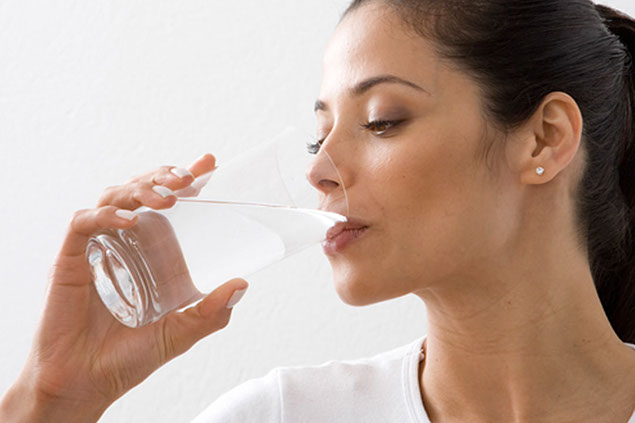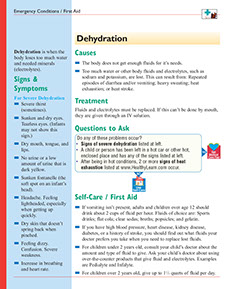CONDITIONS
SYMPTOM CHECKER
Male
Female
Child
Arm, Hand & Shoulder Concerns
Legs & Feet Concerns
Dental & Mouth Concerns
Ear & Nose
Eye Conditions
Head Conditions
Arm, Hand & Shoulder Concerns
Legs & Feet Concerns
Front
Back
Arm, Hand & Shoulder Concerns
Dental & Mouth Concerns
Ear & Nose
Eye Conditions
Head Conditions
Arm, Hand & Shoulder Concerns
Dental & Mouth Concerns
Ear & Nose
Eye Conditions
Head Conditions
Front
Back
Arm, Hand & Shoulder Concerns
Neck Links
Head & Neck Concerns
Arm, Hand & Shoulder Concerns
Neck Links
Head & Neck Concerns
Front
Back
Online Clinic
Wise Healthcare
Dehydration
Print on Demand
RELATED ARTICLES
Dehydration is when the body loses too much water and needed minerals (electrolytes).
For Severe Dehydration
• Severe thirst (sometimes).
• Sunken and dry eyes. Tearless eyes. (Infants may not show this sign.)
• Dry mouth, tongue, and lips.
• No urine or a low amount of urine that is dark yellow.
• Sunken fontanelle (the soft spot on an infant’s head).
• Headache. Feeling lightheaded, especially when getting up quickly.
• Dry skin that doesn’t spring back when pinched.
• Feeling dizzy. Confusion. Severe weakness.
• Increase in breathing and heart rate.
Treatment
Fluids and electrolytes must be replaced. If this can’t be done by mouth, they are given through an IV solution.
Questions to Ask
Question 1
Do any of these problems occur?
• Signs of severe dehydration.
• A child or person has been left in a hot car or other hot, enclosed place and has any of the signs listed at left.
• After being in hot conditions, 2 or more signs of heat exhaustion.
Get medical care without delay. If symptoms are life threatening go to the ER or call 9-1-1. Don’t call 9-1-1 or use the ER if symptoms do not threaten life. Ask your doctor ahead of time where you should go for a problem that needs prompt care, but not emergency care.
Use Self-Care / First Aid:
You can probably take care of the problem yourself if you answered NO to all the questions. Use the “Self-Care” measures that are listed. Call your doctor if you don’t feel better soon, though. You may have some other problem.
Self-Care / First Aid
• If vomiting isn’t present, adults and children over age 12 should drink about 2 cups of fluid per hour. Fluids of choice are: Sports drinks; flat cola; clear sodas; broths; popsicles; and gelatin.
• If you have high blood pressure, heart disease, kidney disease, diabetes, or a history of stroke, you should find out what fluids your doctor prefers you take when you need to replace lost fluids.
• For children under 2 years old, consult your child’s doctor about the amount and type of fluid to give. Ask your child’s doctor about using over-the-counter products that give fluid and electrolytes. Examples are Pedialyte and Infalyte.
• For children over 2 years old, give up to 1-1/2 quarts of fluid per day.
This website is not meant to substitute for expert medical advice or treatment. Follow your doctor’s or health care provider’s advice if it differs from what is given in this guide.
The American Institute for Preventive Medicine (AIPM) is not responsible for the availability or content of external sites, nor does AIPM endorse them. Also, it is the responsibility of the user to examine the copyright and licensing restrictions of external pages and to secure all necessary permission.
The content on this website is proprietary. You may not modify, copy, reproduce, republish, upload, post, transmit, or distribute, in any manner, the material on the website without the written permission of AIPM.
2021 © American Institute for Preventive Medicine - All Rights Reserved. Disclaimer | www.HealthyLife.com
















































